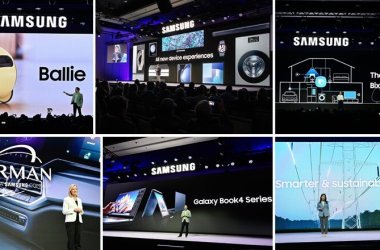As the battle between Apple’s iPhone 5 and Samsung’s Galaxy S III rages on – a study conducted by the disassembly firm iFixit and nonprofit organisation Ecology Centre has concluded that the iPhone 5 is less toxic than the Galaxy S III smartphone.
The study, which sought out the levels of hazardous chemical contents in smartphones, placed the iPhone 5 at the fifth spot with a 2.8 score out of an overall rating of 5, and the Galaxy S III in the ninth spot with a rating of 3.0. Both phones were topped by Motorola’s Citrus, which took the top spot, followed by LG’s Remarq, the iPhone 4S and Samsung Captivate.
The study’s goal was to identify the environmental friendliness of smartphones, and to check the levels of hazardous substances that could be potentially damaging to the environment and human health. IFixit and Ecology Centre disassembled 36 mobile phones released in the last 5 years, and tested for 35 substances including chlorine, mercury, lead, arsenic, chromium, cobalt, copper, nickel and cadmium. Tests were conducted on cases, processors, buttons, circuit boards, screens and other hardware. Results of the study are available on Ecology Centre’s HealthyStuff.org website.
The new iPhone 5 is a big improvement over the original iPhone, which was released in 2007 and has been rated the most toxic in the study. Also among the most toxic phones are the Nokia N95, which also shipped in 2007, and Research In Motion’s BlackBerry Storm 9530, which shipped in 2008.
Every phone contained at least lead, bromine, chlorine, mercury and cadmium, according to the study. The Samsung Galaxy S III and iPhone 5 had some levels of lead and mercury contents.
The study was based on 1,100 samples of smartphones, with three for each brand, said Jeff Gearhart, research director at Ecology Centre.
The goal was to point out the environmental friendliness of the smartphones, Gearhart said. The effects of hazardous materials could linger for years, and a wide range of contaminants could show up in air or soil years after smartphones are discarded.
It is critically important that smartphones are properly recycled to limit the effects of hazardous materials, Gearhart said. Smartphones tend to be chemically intensive, but the mobile industry is making great progress in reducing hazardous chemicals.
Part of the improvement in the smartphones comes through removal of hazardous substances. More smartphones are using cables free of polyvinyl chloride (PVC), mercury-free LCD displays and arsenic-free glass. Environmental organisations like Greenpeace regularly carry out tests to check computers for PVC plastic and brominated flame retardants (BFRs). PC makers like Apple, Hewlett-Packard and Dell have been reducing the use of PVC plastic and BFRs in computers in an effort to go green.
Electronics companies are producing cleaner smartphones, but the use of toxic chemicals needs to be discouraged through better regulation, Gearhart said. In 2003, the European Union adopted the ROHS (Restriction of Hazardous Substances Directive), which restricts hazardous substance use in electronics. Efforts are also underway in the U.S. to restrict the use of toxic chemicals in electronics.
There are also ongoing concerns around consumers dumping toxic electronics in waste, which could eventually hurt the environment. Some nonprofit organisations such as Basel Action Network are encouraging recycling and chasing down organisations that send electronics to developing countries, where the products are burned instead of recycled.
A study by the U.N. in 2010 revealed that the e-waste generated by PCs, consumer electronics and appliances would grow by 2020. Discarded mobile phone e-waste in 2020 will be about 18 times higher in India than the 2007 levels and seven times higher in China.
But electronics companies are offering instructions on how products can be recycled for free. Wireless carrier T-Mobile includes return labels in some smartphones so the products can be sent free of cost to recycling centres.






